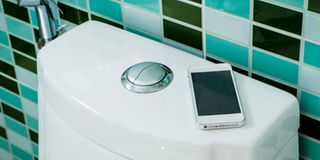Germ-spreading habits to give up

It is not advisable to use your phone in the toilet and if you do, ensure it is sanitised . PHOTO/NET
What you need to know:
- Some of these habits are detrimental to our health as they are a medium through which germs are spread.
Humans are habitual beings, always forming habits as a way of life. However, some of these are detrimental to our health as they are a medium through which germs are spread.
Using your phone while in the toilet
It could be that you need some me-time from the children to send some messages, or some privacy from prying eyes. Whichever the case, texting, or using your phone while in the toilet is unhygienic. For example, Dr David Musoke, a researcher of environmental health at the School of Public Health, says you will use your hands to lower the toilet seat and in so doing, get your fingers and palm germ packed. Then you will touch the phone, hence transfer these germs to your phone.
“Also, remember that when responding to nature, germs, not forgetting faecal matter, are released into the environment, hence landing on surfaces, including your phone. Even after you have washed your hands with soap, you will touch the phone surface and contract more germs. To avoid this, you are better off attending to your phone out of the toilet,” he says.
Dr Musoke says you should get into the habit of cleaning your phone regularly with a slightly wet and soapy towel to get rid of germs.
Sharing towels
While adults may not share body towels, sometimes, children will. However, Dr Robert Ssooka of Makerere University Hospital, says a towel carries germs because after bathing, our bodies are not totally germ free. “With towel sharing, parents would only be allowing for germs to bounce between their children. More to that, seeing that towels are not washed on a daily basis, there is also room for germ multiplication, which makes room for infections,” he says.
He adds that for households where the hand towel is not washed often, it serves as a place for germ buildup, which accounts for several stomach ache complaints, more so among children,” he shares, adding that it is better to use paper towels.
Flushing with the toilet lid up
The lid is not a cosmetic part of the toilet set. It has uses, one of which is to cover the toilet after using it. “Therefore, when you flush with the lid open, you are only allowing, not just water but also other bacteria to contaminate your environment. These will contaminate everything within the toilet,” Dr Ssooka shares. So, the next time you finish answering nature’s call, close the lid before you flush.
Chewing pens
Chances are, you will place your pens in various places such as on a table that is definitely not clean. You will also often touch them and yet your hands are not always clean. So, when you put them into your mouth, either to aid thinking or because you are nervous, you are allowing the transfer of germs from the pen to your mouth.
However, Dr Ssooka says it is also important to remember that when nervous, we do not pay attention to some things such as fragments coming off the pen that you will easily swallow, which is not good for your health.
Using your teeth to open items
Yes, they are convenient and sharp. However, you have no idea where the items have been and the kind of germs they have pooled. So, when your teeth touch the item, germs will simply make their way to your mouth.
“To avoid such contamination, get into the habit of using devices such as an opener, scissors or a knife to open packages and other items,” Dr Musoke shares.
Hair in your brush
Apart from caring how ugly the comb will look when pulled out in public, most people do not care about removing hair from their brush or cleaning it at all.
Dr Ssooka shares that these brushes also harbour dead skin that if not removed, finds its way back to the head. “Not only is it unhygienic to have dead skin collect in your brush, you will look untidy with dandruff all over your head. To clean your brush, soak it in warm soapy water at least on a weekly basis while also removing any hairs therein,” he advises.
Children’s toys
It is great to have a designated place for the children to play and a proper storage place for the toys. However, Dr Musoke says you also need to give them a wash, more so if there is more than one user.
“Children’s immune systems are not well developed, yet they are not always in a hygienic environment as they play. It will, therefore, be great to wash these toys as frequently as possible, and to sun dry them,” he says, adding that babies and younger children are particular vulnerable to diseases from dirty items, especially since they put many things they touch in the mouth.
Using dish sponge for other tasks
Dr Robert Ssooka of Makerere University Hospital says while it is important that you keep your kitchen and cooking spots clean, using the dish washing sponge to clean them is not hygienic.

He adds that you should avoid using it to clean the sink as it has lots of dirt, being used for various tasks such as washing vegetables which have other bacteria such as E.coli. Therefore, get a different sponge for the various activities and ensure that they are kept clean and dry.





